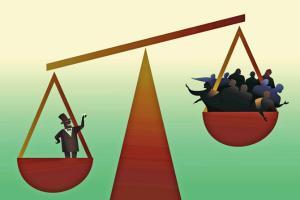Our propensity for exploitation of the weak means that some Indians will always make hay while everyone else cries

Representation pic/Getty Images
 This will come as a surprise to no one who has lived in India for more than a week or so: We have no respect for the lives of others. That fact was brought home more forcefully than usual in the days after COVID-19 began making its dangerous way among us. What prompted communities and people in thousands of places around the world to come together, quickly became an excuse for some of us to exploit the less fortunate. While some people chose to be better, many simply looked the other way.
This will come as a surprise to no one who has lived in India for more than a week or so: We have no respect for the lives of others. That fact was brought home more forcefully than usual in the days after COVID-19 began making its dangerous way among us. What prompted communities and people in thousands of places around the world to come together, quickly became an excuse for some of us to exploit the less fortunate. While some people chose to be better, many simply looked the other way.
ADVERTISEMENT
Nowhere was this more obvious than in the healthcare industry, where one could almost hear the owners of private hospitals rub their hands in glee at the prospect of doling out a stream of inflated bills far into the foreseeable future. Media reports began to trickle in, then quickly flood our timelines, documenting instances of patients being declared ill even when they were not, or declared healthy even when they were not, all because someone, somewhere, wanted to turn tragedy into profit. Even the dead weren't spared until medical bills had been cleared, but that didn't shock us either.
The mother of a friend was hospitalised with breathing issues and diagnosed with pneumonia. The friend in question told me about the nightmare of finding her a hospital and managing it only because he happened to know a doctor who helped. He spoke of options he had been offered based on what he could afford, which I thought was an affront to everything that is good. When someone we love is in need of medical assistance, we shouldn't have to choose between offering them life or death based upon our savings. And yet, that is the reality accepted by millions of Indians long before the virus appeared. What we earn alone determines whether or not we will be saved.
There were other examples of ruthlessness that upset me as the weeks passed, along with all kinds of rumours about government employees using the pandemic to extort money from vulnerable folk in ruthless and innovative ways, even as shopkeepers began to double the prices of some products.
What worries me now is the staggering loss of jobs, which means a lot more people will suddenly have a lot less to lose. As economists warn of a crisis based on rising unemployment, the police have already reported an increase in cybercrimes since our first lockdown. People have complained about being cheated via online transactions, and there has been a rise in the number of fake websites prompting dubious transactions.
Also established is an increase in banking fraud related to debit and credit cards, and other bookings. Apparently, there are also free Coronavirus tests being offered, along with promises of jobs abroad, in a bid to separate the most vulnerable among us from their savings.
A country as poor as ours will always struggle with widening gaps between the haves and have nots. It would be naïve to expect those who have almost nothing to not try everything in their power and grab what they can. Everything about India today forces us all to be aspirational and expect more for less. We refuse to acknowledge that capitalism has failed to trickle down to those who need help the most, and must deal with the inevitable repercussions of its failure. What hurts most is the lack of grace shown by those who already have so much.
Millionaires around the world became billionaires in 2020, their bank balances built upon the backs of people their companies had broken. Businessmen in India chose to walk that same path with glee, looking for loopholes they could exploit, public assets they could acquire cheaply, or corners they could cut with impunity, even as everyone else struggled to find bottles of hand sanitiser.
We need to think about what we are turning into when even a virus that has already claimed 1,00,000 lives fails to change our approach to life. As if things weren't bad enough at the start of the year, over 400 cybercrime cases were registered by July against people using hate speech to give the pandemic a communal angle.
A vaccine may come in the next month, or even a year later. It may help us deal with COVID-19 and get back to the way we used to live. What we should really worry about is whether we will ever find a cure for the naked materialism and bigotry that is now part of our culture.
When he isn't ranting about all things Mumbai, Lindsay Pereira can be almost sweet. He tweets @lindsaypereira
Send your feedback to mailbag@mid-day.com
The views expressed in this column are the individual's and don't represent those of the paper
Keep scrolling to read more news
Catch up on all the latest Mumbai news, crime news, current affairs, and a complete guide from food to things to do and events across Mumbai. Also download the new mid-day Android and iOS apps to get latest updates.
Mid-Day is now on Telegram. Click here to join our channel (@middayinfomedialtd) and stay updated with the latest news
 Subscribe today by clicking the link and stay updated with the latest news!" Click here!
Subscribe today by clicking the link and stay updated with the latest news!" Click here!






